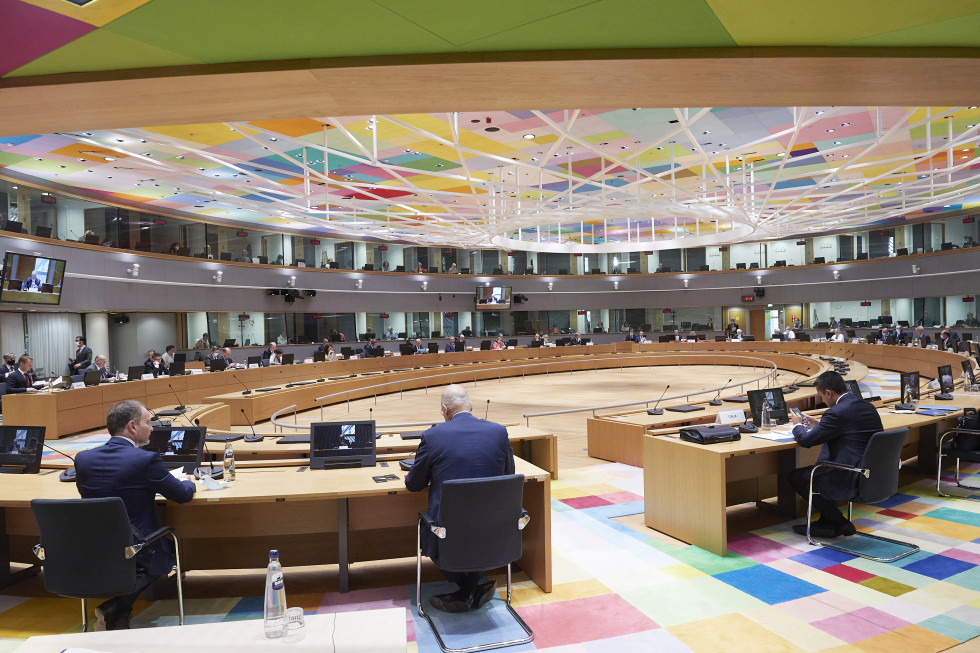Minister Dr Logar at the EU Foreign Affairs Council meeting on Libya, Belarus and EU-AU relations
- Ministry of Foreign Affairs
- Permanent Representation to the European Union Brussels

Meeting of foreign ministers | Author Svet EU
On the subject of the latest developments in Libya, High Representative of the Union for Foreign Affairs and Security Policy Josep Borell debriefed ministers on his visit to the country and they then exchanged views on further steps towards securing a ceasefire and normalising the situation. They expressed support for the truce announced between Prime Minister of the Government of National Accord of Libya Sarraj and Speaker of the House of Representatives Saleh, and for the resumption of the stalled political dialogue, in line with the Berlin Process. Slovenia welcomes the announcement of the ceasefire and the agreement on the immediate cessation of military operations, departure of foreign fighters and mercenaries, and continuation of the negotiation process in the framework of the UN-led Berlin Process.
The ministers were brought up to date on the groundwork for the EU-AU Ministerial Meeting and Summit, which were scheduled for this autumn but have now been postponed following a ministerial agreement. This provides additional time for preparations in pursuit of tangible results and strategic ambitions in partnership with Africa. The ministers went on to exchange views on the EU’s priorities in its relations with Africa, while the Commission provided them with an update on the state of play of the post-Cotonou negotiations. The new agreement replacing the existing Cotonou Agreement which has already expired, will set out the objectives of the partnership between the EU and the African, Caribbean and Pacific (ACP) countries for the coming 20 years. Minister Logar firmly supported the further strengthening of political, economic and multilateral ties and cooperation between the EU and the AU countries, as well as the negotiations on the new Partnership Agreement between the EU and the ACP countries.
The ministers then turned to the topic of the latest developments in Belarus, where the widely supported protests against the outcome of the presidential elections continue. They underlined the need for restrictive measures, support for national dialogue, and financial support for civil society in Belarus. Minister Logar advocated for determined and uniform EU and NATO approach to the Belarusian authorities, which are being urged to ensure respect for human rights and fundamental freedoms, international standards and free and fair elections, and to guarantee the freedom of the press, association and speech.
During the working lunch, the ministers held a strategic discussion on the Southern Neighbourhood, including the future partnership with the region and planning of bilateral aid. Slovenia believes that achieving stability in the Mediterranean is of the utmost importance for security and stability in the EU, and thus supports the EU’s enhanced political and on-the-ground involvement with Slovenia’s southern neighbours. This year, as we mark the 25th anniversary of the Barcelona Process, provides an excellent opportunity to significantly improve those relations.
Before attending the FAC meeting, Minister Logar participated in the ministerial breakfast with Svetlana Tikhanovskaya, the opposition candidate for the presidential elections in Belarus. At the invitation of the Foreign Minister of Slovakia, he also attended the meeting of ministers from the informal group of Central European countries called C5 (Austria, the Czech Republic, Hungary, Slovakia and Slovenia) with EU Special Representative for the Belgrade-Pristina Dialogue and other Western Balkan regional issues Lajčák who provided an update on the latest developments in the Dialogue.

